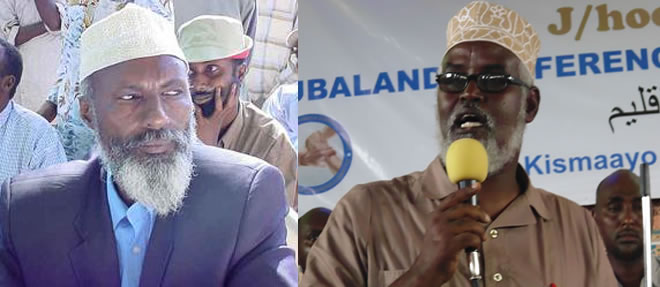

Adan Barre Hiiraale (left) and Sheikh Ahmed Mohamed Islam (Ahmed Madobe)
A warlord in southern Somalia's Jubaland has declared himself "president" of the region, clan leaders said Thursday, shortly after the election of another militia commander to the post.
With tensions already high, the move raised the risk of clashes between rival factions in the southern port city of Kismayo, a former stronghold of the Al-Qaeda-linked Shebab, where Kenyan troops in an African Union force are now based.
The city was quiet Thursday, but residents have reported clan militia reinforcing their positions across Kismayo.
On Wednesday, former Islamist warlord Ahmed Madobe was elected Jubaland's "president" by a conference of some 500 elders and local leaders.
Neither the title nor the region itself is recognised by the weak central government in Mogadishu.
His supporters -- including the powerful Ras Kamboni militia -- fired heavy machine guns into the sky to celebrate his appointment, residents said.
"They were firing guns late into the night...the situation is calm now but the city is tense, there are fears of clashes between militia," Kismayo resident Hassan Mohamud told AFP.
Madobe is a key ally of Kenya, and his appointment risks opening a rift between Nairobi and Mogadishu.
But shortly afterwards, former Somali defence minister and warlord Barre Hirale, who comes from a rival clan, declared himself also president after a separate conference.
"I was nominated president of Jubaland by the elders...I call on the people to support my presidency to assist me in bringing peace," Hirale told reporters.
"The conference where I was nominated was organised and belonged to the people... while the other conference was organised and pushed by Kenya," he added, calling on people "to lay down their arms and help rebuild the region."
Hirale, a veteran militia commander from the Marehan clan, has in recent years been backed by Ethiopia to battle Shebab insurgents.
Both elections are understood to be opposed by the central government in the capital Mogadishu, which is keen to stamp its authority on the lawless and war-ravaged nation, not to see further regional splits.
There was no immediate reaction to developments from Mogadishu.
"If fighting breaks out in Kismayo, it will be the Somali government that will take responsibility for the bloodshed, because they are creating instability between brotherly clans," Madobe told reporters.
Residents in Kismayo said they now had two leaders.
"Today we have two presidents, and one of them is aided by Kenya's army...the city is quiet but people are not moving in the streets as they are worried," Kismayo resident Ahmed Ali said Thursday.
"Clan militia supporting either side are reinforcing their positions across the town," he told AFP by telephone.
Jubaland lies in the far south of Somalia and borders both Kenya and Ethiopia, and control is split between multiple forces including clan militia, the Shebab, Kenyan and Ethiopian soldiers.
Jubaland joins other semi-autonomous regions of the fractured Horn of Africa nation, including Puntland in the northeast -- which wants autonomy within a federation of states -- and Somaliland in the northwest, which fiercely defends its self-declared independence.
Invading Kenyan troops -- now part of the AU force mandated to support the government in Mogadishu -- captured Kismayo alongside Madobe's troops in October 2012.
Madobe, from Somalia's Ogadeni clan, was once governor of Kismayo and a key member of the Islamic Courts Union -- whose armed wing was the Shebab -- that was toppled by Ethiopia's 2006 US-backed invasion of Somalia.
During the invasion he was wounded in a bombing raid in southern Somalia, and was captured and taken to Ethiopia, spending at least two years in jail.
After his release, in late 2011 he switched allegiance to battle his former Islamist comrades by fighting alongside Kenyan troops.
Source: AFP
No comments:
Post a Comment